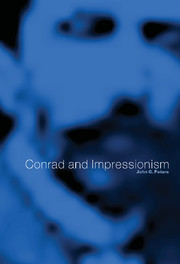Book contents
- Frontmatter
- Contents
- Preface
- Acknowledgments
- List of abbreviations
- Introduction. Objects of consciousness in Conrad's impressionist world
- 1 Subject/object: science and the epistemological origins of literary impressionism
- 2 Objects and events in the “primitive eye”: the epistemology of objectivity
- 3 Other-like-self and other-unlike-self: the epistemology of subjectivity
- 4 “Sudden holes” in time: the epistemology of temporality
- 5 Radical relativism, epistemological certainty, and ethical absolutes: Conrad's impressionist response to solipsism and anarchy
- Epilogue
- Notes
- Selected bibliography
- Index
1 - Subject/object: science and the epistemological origins of literary impressionism
Published online by Cambridge University Press: 22 September 2009
- Frontmatter
- Contents
- Preface
- Acknowledgments
- List of abbreviations
- Introduction. Objects of consciousness in Conrad's impressionist world
- 1 Subject/object: science and the epistemological origins of literary impressionism
- 2 Objects and events in the “primitive eye”: the epistemology of objectivity
- 3 Other-like-self and other-unlike-self: the epistemology of subjectivity
- 4 “Sudden holes” in time: the epistemology of temporality
- 5 Radical relativism, epistemological certainty, and ethical absolutes: Conrad's impressionist response to solipsism and anarchy
- Epilogue
- Notes
- Selected bibliography
- Index
Summary
“Life and the arts follow dark courses, and will not turn aside to the brilliant arc-lights of science.”
“The Ascending Effort”“The fetish of today is neither royalty nor religion … The sacro-sanct fetish of to-day is science,” Mr. Vladimir confidently asserts early in The Secret Agent (SA 29). Later, Ossipon concurs: “Science reigns already. It reigns in the shade maybe – but it reigns” (SA 227). During the nineteenth century, science achieved a privileged position in the western world. For many, it seemed to provide a certainty unavailable elsewhere. Science yielded “facts”: information believed to be objectively verifiable and hence true. Science and scientific methodology also provided the backdrop for many of the revolutionary challenges to conventional thinking that arose during the century. Through the work of Charles Lyell, Charles Darwin, and others, developments in geology, biology, and other scientific disciplines challenged long-held social beliefs concerning the nature of the Earth and the nature of humanity. Other thinkers made equally challenging assertions. In the hands of Auguste Comte, John Stuart Mill, and those who followed them, such as Herbert Spencer, Cesare Lombroso, Hippolyte Taine, Ernest Renan, G. H. Lewes, Emile Durkheim, Leslie Stephen, and numerous others, this new view of the power of science evolved into scientific positivism, a movement based upon the belief that all knowledge could be obtained through scientific methodology. Following in the wake of science, some disciplines adopted scientific methodology, while others were either influenced by it or reacted against it.
- Type
- Chapter
- Information
- Conrad and Impressionism , pp. 7 - 34Publisher: Cambridge University PressPrint publication year: 2001



